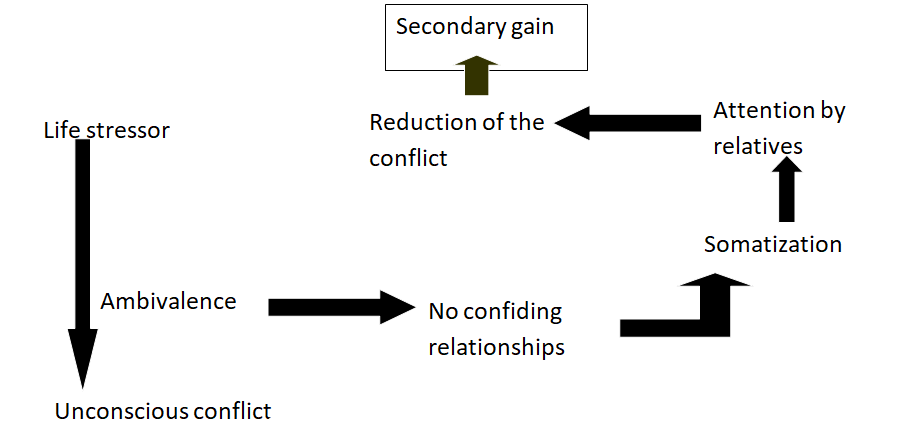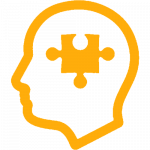Conversion Disorders (Hysteria)
Conversion disorder, earlier called Hysteria, involves a pattern in which pseudo-neurological symptoms of some physical malfunction or loss of control appear without any underlying organic pathology. Hippocrates coined the name HYSTERIA- meaning Wandering uterus. According to him this occurs only in females due to wandering of uterus inside the abdomen. His treatment was – MAARIAGE & SEX relieves the symptoms. Examples: Paralysis of limbs, Seizures called “Pseudo seizures”, Fainting attacks, Blindness, double vision, Mutism, deafness, , Abnormal body movements, abnormal gait (astasia abasia), Sensory loss-hemi- anesthesia, parasthesia.
The essentials of Conversion disorder

- · Presence of symptoms or deficits affecting motor or sensory function, suggesting a medical or neurological disorder.
· Detailed physical examination and investigations do not reveal any abnormality that can explain the symptoms adequately
· A clear temporal relationship between stressor and development of symptoms.
· Patient does not intentionally produce symptoms
· The onset of these symptoms are usually sudden, causes significant disturbances in social – occupational functioning
· Usually brought to a medical or neurological setting
· The patient seems to be not much worried about the symptoms called “la belle indifference”
· Psychodynamic theory states that certain unconscious conflicts are converted to a physical symptom known as “Primary gain”
· Presences of these symptoms have a definite “Secondary gain” to the patient as she gets the reward she wished.
· Sometimes the whole family will get the benefit because of the illness- father who has to pay interest on loan , the lender will sympathize and waive interest for that month – Tertiary gain
· A true symptom or illness is found in past or within the family called “Identification”
Pathogenesis

Diagnosis
These patients are usually referred to the psychiatrist by physicians or neurologists, yet requires a through clinical examination which does not reveal a underlying neurological disorder.
The symptoms are found in presences of the close relatives, usually a set of anxious and concerned family members surrounds patient.
Injuries due to fall, tongue bite, incontinence are absent
During the episode though the patient is unresponsive he/she may be aware of the surroundings
Most often through “suggestion” we can bring out the symptoms or even to disappear
Example: though gentle suggestion we can make the patient faint and develop jerky movements of limbs, and can be revoked to normalcy by simple maneuvers.
Clinical tests that
helps to identify conversion disorder
- Face to hand test: In a patient who is unresponsive (fainting episode) lift the hand over the face and drop it suddenly ; in organic cause the hand will fall over the face, while in conversion disorder it would fall over the side thus preventing injury to face.
- Eye opening test: when attempted to open the eyes these patient’s eyes may roll up thus preventing examination.
- Hysterical blindness: patient may complain of tubular vision, when asked to walk they do, with tendency to fall but do not injure and would avoid obstacles.While conversing suddenly ask the patient “look at your hand” patient may say I can’t -even blind person can do it even if he is unable to see his hand. Corneal reflex will be intact.
- Hysterical cough would be superficial, dry and noisy.
- Hemi-anesthesia patient may complain of sensory loss exactly in midline, including tongue, nose and eyes- which do not happen in true neurological disorder as nerve supply to these organs overlap.

Differentiation between true and pseudo -seizures
| Clinical Points | Epileptic Seizures | Hysterical Convulsions |
| Eye gaze | starring | Avoid gaze |
| Incontinence, Injury, tongue bite | present | absent |
| Amnesia | Complete | Partial |
| Neurological Signs | Present | Absent |
| Post- ictal Confusion | Present | Absent |
| Stress | Present – 25 % | 100% |
| EEG | Abnormal | Normal |
| Serum Prolactin | Increased in post-ictal Period | Normal |
Etiology
- Women; 2-10 times common than men.
- Children below 13 years
- Low socioeconomic status
- Low education
- Youngest sibling
- Rural background
- Military field
- Subnormal intelligence
- Histrionic Personality disorder
- When there is lack of confiding relationships
- Life events and chronic stressors.
Management
Make sure of the diagnosis; seek consultation with respective specialist in case of doubt of organic pathology. Once diagnosed patient has to be admitted for 3-5 days, and Psycho education to the caregivers is most essential.
Conversion disorder patients are usually attention seeking and their symptoms increase with focus of attention. The first step in management is not to give importance to these symptoms, it should be ignored, this is difficult by a family member, yet it is suggested strongly, visitors are discouraged.
The patient is allowed to describe their life circumstances probing in depth of the recent life stressors. This may be difficult for these patients as they may either mask their stressor or do not accept that to be the cause for their symptoms.
Projective Test
In such cases Projective tests are used to identify possible areas of stressor
Example : Sentence completion test (SET), Thematic Apperception Test(TAT), Draw a person test”
In SCT-there will be set of 60 half completed sentences where the patient has to fill the rest half immediately on what thought that crosses their mind
Example: my childhood was………………………, my father is………………..,
TAT is a set of 10 cards with black& white pictures on it, patient is allowed to write a short story by seeing each card, it is said the patient unconsciously may write their own life history that would give us a clue in understanding their life circumstances. The first card has a boy found sad and holding a violin- the story the patient writes about this can give us a clue about the patient ambitions in life, the sixth card may give us a clue to sexual difficulties in patients life, the IX card a women sitting in dark, the last one is a blank card- that can describe the whole life situation.
Irrespective of these projective tests, patient is allowed to ventilate about their life events.
If everything fails, psychiatrist will decide about Narco Analysis.
Treatment
- Reassurance
- Problem solving
- Involving family members in deciding the course of action
- Finally Psycho education to the patient about the nature of stressor and the onset of symptoms, and encouraged to express their concern, difficulties to significant others, rather than suppressing within themselves.
- Associated Depression and Anxiety are managed using appropriate medications
Case Vignette
Ms X an 18 year old girl presented with sudden onset of weakness in her right leg, and unable to walk without support. Her family members brought to a neurologist who found all the relevant examinations and investigations were normal, doubted it is functional (psychological), hence referred to his psychiatrist colleague.
The relatives initially reluctant later accepted to consult the psychiatrist. To the psychiatrist room the Ms X was brought by her family members two of them holding her arms, and at least 10 others were anxiously surrounding her.
A brief history was taken from the relatives who said that the Ms X was about to get married next week. Ms X was interviewed confidentially, after getting rapport, she told that she was in a dilemma that if she gets married next week she can’t continue her studies and has to walk a long distance to her college from her in-laws home. She felt that it would be better that if the marriage is postponed till her exams in next 2months. Her symptoms were found to aggravate when she remembers about the marriage, or in presence of family members.
Conversion disorder was diagnosed with the presence of a psychological stressor that is precipitating the physical dysfunction and there are no medical or neurological correlations to explain the dysfunction.
Ms X was now motivated to express her concern, both to her parents and her in-laws, they discussed with the psychiatrist and arrived to a solution, her in-laws accepted to let her be with her parents till her exams get over, while the marriage should happen on the fixed date. This gave a satisfactory relief, she was found walking steadily within a couple of days.






















